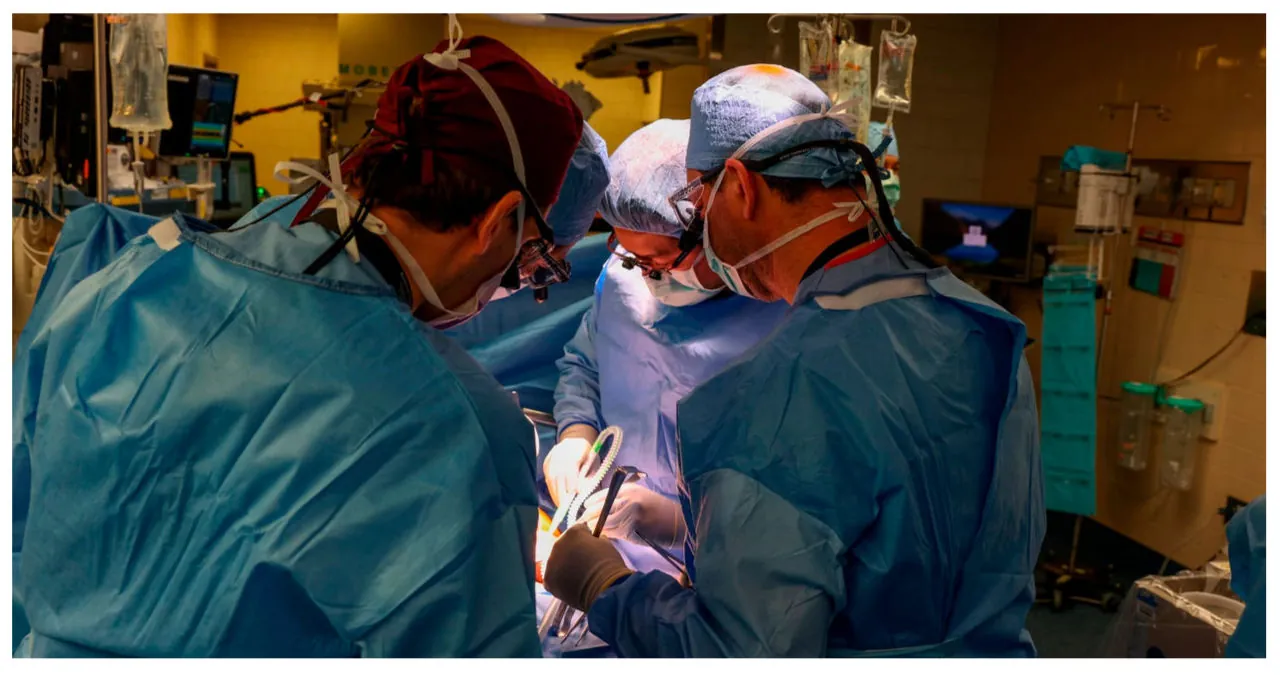A surgical team announced on Thursday that they have successfully performed the world’s first ever transplantation of a genetically edited pig kidney into a living human being.
During a four-hour procedure earlier this month, surgeons at Massachusetts General Hospital successfully connected the blood vessels and ureter of a pig kidney to those of Richard Slayman, a 62-year-old man suffering from end-stage kidney disease. The hospital reports that Slayman is recovering well.
Massachusetts General declares that the procedure is a significant achievement in the quest to make organs more accessible to patients in need.
Dr. Tatsuo Kawai, a member of the surgical team, expressed his joy and gratitude for the successful kidney transplant. He acknowledged the immense effort put in by thousands of scientists and physicians over the span of many years. Dr. Kawai stated that being part of this milestone was a privilege, and he hopes that the transplant approach will provide a lifeline for countless patients worldwide who are battling kidney failure.
The hospital reported that the patient, who resides in Weymouth, a town located 16 miles southeast of Boston, has been managing Type 2 diabetes and hypertension for a significant period of time. Prior to receiving a kidney transplant from a deceased donor at Massachusetts General Hospital in December 2018, the patient had been undergoing dialysis treatment for several years.
Unfortunately, five years later, Slayman’s kidney started to fail once again. As a result, he had no choice but to go back to dialysis in May 2023. This decision significantly impacted his overall quality of life, according to the hospital.
In a statement, Slayman expressed her perspective on the procedure, stating that she saw it not only as a means to assist herself, but also as a source of hope for the many individuals in need of a transplant in order to sustain their lives.
During the press conference, Dr. Joren Madsen, director of the Mass General Transplant Center, highlighted the incredible courage and willingness of the patient to undergo a surgery that was once considered unimaginable. He emphasized that it was this individual’s determination that allowed medical professionals to venture into unexplored medical territory.
The hospital revealed that eGenesis, a pharmaceutical company located in Cambridge, supplied the kidney. They utilized CRISPR-Cas9 technology to genetically edit a pig donor, removing undesirable pig genes and incorporating specific human genes to enhance compatibility with humans. The ultimate goal of this genetic modification is to minimize the risk of rejection.
Researchers at NYU Langone Health in New York City carried out a two-month study involving a genetically engineered pig kidney transplant in a 58-year-old man who had been declared brain dead, with the consent of his family. During the study, the team observed mild rejection of the transplant, which was successfully reversed by increasing the dosage of immunosuppression medication.
In a groundbreaking study recently published in the journal Nature, an incredible medical feat was achieved. A 50-year-old man in China, who was deemed clinically dead, became the first person to undergo a liver transplant using an organ from a pig. The remarkable procedure involved stitching the pig’s liver to the man’s blood vessels, and astonishingly, it remained successfully in place for a period of 10 days before being eventually removed. This groundbreaking development opens up new possibilities and raises hope for future advancements in medical science.
There is optimism among experts regarding the potential of animal-to-human organ transplantation to revolutionize the availability of organs for patients in need.
The use of edited animal organs raises concerns about their long-term effectiveness, safety, and the ethical implications of raising animals for human organ transplantation.
According to the Health Resources and Services Administration (HRSA), an agency of the U.S. Department of Health and Human Services, there are currently over 103,000 individuals – men, women, and children – on the national transplant waiting list.
Every eight minutes, a new individual joins the transplant waiting list, while a heartbreaking 17 lives are lost daily due to the lack of available organs for transplantation. The urgency of this issue was further highlighted in a study published in the Journal of the American Society of Nephrology in September 2022, revealing that numerous potential donor kidneys in the United States are needlessly discarded.
If these kidney transplants are proven to be effective and safe, they could potentially eliminate the need for dialysis in the United States. This would be a significant development, as over 500,000 individuals currently rely on dialysis for their survival.

